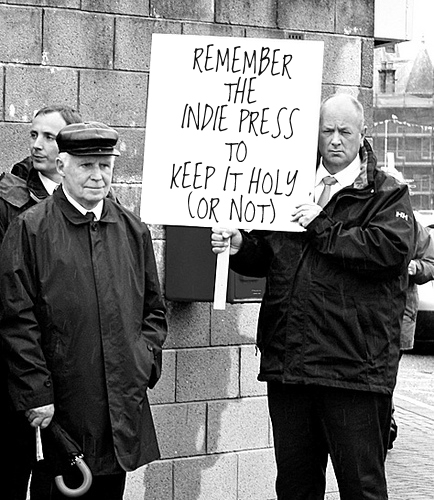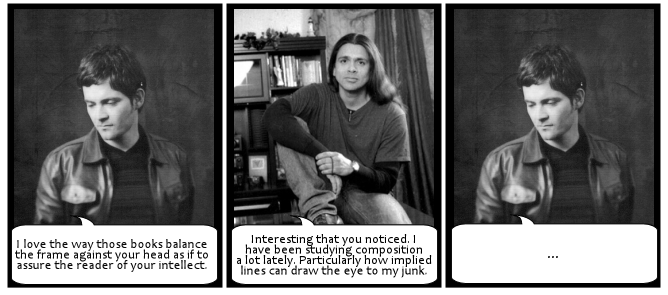Can you talk about a single book for one hour every week? Ministers/Priests/Pastors/Reverends/Etc. do. Why shouldn’t more books get the attention that religion texts do? Okay, most books don’t have a centuries-long history, a following (even a lukewarm one), or a cultivated lifestyle (excluding the Twilights and Harry Potters). What most books do have in common with religion texts is an industry infrastructure built to support their messages and the text itself; compelling narrative for the ultimate goal of better understand the human condition. But week after week after week…how? Religious clergy have the amazing ability to use a single book as a point of reflection for EVERYTHING, from contemporary world events to domestic irritants. Natural disaster? War? Impoverished country? Acne? Grab a Bible, right? Why not grab The Confederacy of Dunces or House of Leaves? Each has interesting characters. Each depends on the reader’s own moral scope for impact.…
Tag Archives other writers
 Honestly, when in the company of commercial press authors, defending my place as independent press author can be difficult. To those who have “made it” into the commercial presses, I would assume my defense comes across not nearly as articulately and convincingly as I would hope. Afterall, the examples of small press authors immigrating into the world of commercial presses far outweighs the number of commercial authors willing to emigrate to the small press world. The commercial press gatekeeper is much more discriminating than the indies; I understanding the disbelief. I too would go commercial if given the right opportunity.
But things are getting easier. Not only are small press books showing face on historically commercial press-dominated shortlists (the recently announced 2010 National Book Critics Circle award finalists includes quite a few small press titles), but with the help of Jane Friedman the various publishing paths have been defined, and by extension, validated.
In the summary of her Writers Digest Conference 2011 talk on publishing options Friedman very clearly explains what she sees as the basic three options for publishing:
Honestly, when in the company of commercial press authors, defending my place as independent press author can be difficult. To those who have “made it” into the commercial presses, I would assume my defense comes across not nearly as articulately and convincingly as I would hope. Afterall, the examples of small press authors immigrating into the world of commercial presses far outweighs the number of commercial authors willing to emigrate to the small press world. The commercial press gatekeeper is much more discriminating than the indies; I understanding the disbelief. I too would go commercial if given the right opportunity.
But things are getting easier. Not only are small press books showing face on historically commercial press-dominated shortlists (the recently announced 2010 National Book Critics Circle award finalists includes quite a few small press titles), but with the help of Jane Friedman the various publishing paths have been defined, and by extension, validated.
In the summary of her Writers Digest Conference 2011 talk on publishing options Friedman very clearly explains what she sees as the basic three options for publishing:
- Tradition
- Independent or niche presses
- Self-publishing/DIY publisher
Pros, Cons, and Requirements: Traditional publishing:Hell, just read the original post.Small/independent press:
- It’s a commercially-driven business
- Competitive – many people are trying to break in
- National distribution – your work needs to merit that
- Slower to market (usually)
- Not the time to experiment
- Persistence & patience
- For non-fiction: you need a platform
DIY:
- Weaker distribution, smaller print run
- More personal attention, dedication
- Usually less money
- Niche marketing – smaller, specialized market; they’re experts in the field
- More accepting of “art” (could be nonprofit), more service-minded
ALL of the options actually require energy to market and promote. It all boils down to you – your strengths, your work, your readers – to determine what’s best.
- Entrepreneurial spirit
- Direct connections with readership (for sales)
- Must be comfortable with technology
- Must enjoy connecting with people (online and off)
- Requires energy to market and promote
The December 31st, 2010 episode of the New York Times Review of Books podcast focused on a conversation on the relevance of professional literary criticism, especially in respects to the ‘everyone does it’ mentality associated with Amazon book reviews, Facebook statuses, and amateur lit crit blogs. Though the entire conversation was extremely interesting, the following point was especially intriguing. Said Katie Roiphe, a professor at the Arthur L. Carter Journalism Institute at New York University, about the current position of a critic in relation to what so many people want to call today’s death of literature (slightly paraphrased; dates are my insertions): It is tempting to say that we live in this dangerous death of literature, but the critic has always said that. If you go back to Matthew Arnold (1822-1888), if you go back to Dwight Macdonald (1906-1982), Randall Jarrell (1914-1965) and their generation. There is something romantic for…
It's that time of year again, when it is acceptable for elitists to boast of their hipster cred. Of course, I am referring to the Top (number) Lists of the year. I'm going to squeeze into my skinny jeans, wrap a scarf around my non-coated body, and crack open a PBR while I compile my best books of 2010 list. The top five Rationale: these are my five favorite books that were published in 2010. Of course, disclaimers apply; I couldn't read every book published, I may not have given some books equal attention, and on and on. However, I can still cull a few favs from the admittedly too-short stack of 2010 books I read. And here they are, in no particular order. What I said: Wolf Parts is vicious fairy tale excursions. Wolf Parts gives metaphor to the ambiguity of adolescence, turning the cautionary tale of “Little Red…
Most of you have liars for parents. Most of you were probably given the stork spiel when asked age-inappropriate questions about the origins of things. Some of you may have been told the truth, in graphic detail, from honest, though morally disinterested, parents. I’m here to tell you the truth. Birds and bees have nothing to do with it. Rémi Carreiro is responsible. Rémi Carreiro gives birth to book covers. Also, he may have some kids; I don’t know. When mocking up cover designs for Stranger Will, I began by searching for some seed images. Quickly, and thankfully, I found Rémi Carreiro’s Flickr gallery. While I ultimately chose his Park Bench image for the cover (well, actually readers of this blog chose the image, via a vote), this guy has some amazing images, many of which feel so perfect for book covers. See what I mean: NOTE: The images captioned…
Episode #009 of The Velvet Podcast is now live! Authors Gordon Highland (Major Inversions), Brandon Tietz (Out of Touch), and Caleb J Ross (Stranger Will) have a spirited conversation about self- and vanity-publishing, debating its legitimacy, logistics, and financial aspects, as well as insights from their own experiences in this oft-scorned segment of the industry. Please, give it a listen. Subscribe via Feedburner, Podcast Alley, or iTunes.





